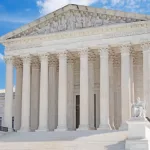
The U.S. Supreme Court signaled hesitation over letting President Donald Trump’s controversial attempt to redefine birthright citizenship proceed while lawsuits challenging the policy are still ongoing.
The high court expressed skepticism as it grilled the federal government’s lawyer on Thursday over Trump’s attempt to end birthright citizenship through executive order, and questioned how the controversial plan could be put into effect. The Trump administration is asking the Supreme Court to narrow the scope of three lower court rulings that halted the policy nationwide.
The case centers on Trump’s proposal to deny automatic citizenship to children born in the U.S. unless at least one parent is a citizen or legal resident. This would mark a sharp departure from the longstanding interpretation of the 14th Amendment, which guarantees citizenship to nearly all born on U.S. soil.
In an uncommon move, the justices heard arguments concerning several emergency appeals by the Trump administration. These appeals aim to limit the reach of nationwide injunctions that halted Trump’s birthright citizenship order almost immediately after it was issued in January. The justices intensely debated the broader question of when nationwide injunctions are appropriate over more than two hours of arguments; however, when it came specifically to birthright citizenship, a majority appeared to believe in this instance that blocking the policy nationwide may have been warranted—especially in lawsuits brought by states.
New Jersey’s Solicitor General warned that limiting injunctions would cause chaos, as people move between states and inconsistent citizenship rulings would be unworkable. Conservative justices including Neil Gorsuch, Amy Coney Barrett, and Brett Kavanaugh, acknowledged these concerns and questioned the feasibility of enforcing Trump’s plan unevenly across the country.
Firmly opposed to allowing Trump’s policy to proceed were liberal justices, who emphasized its conflict with constitutional precedents. Justice Sonia Sotomayor criticized the administration’s legal arguments, while Justice Elena Kagan expressed doubt that the government could implement the plan effectively within the proposed timeframe.
Lower courts have unanimously blocked Trump’s policy, prompting the administration to seek emergency relief from the Supreme Court. Depending on the ruling, the policy could be enforced in some states but not others, raising concerns about legal uniformity.
Despite not directly addressing the constitutional validity of Trump’s proposal, the Court’s decision on the scope of injunctions could affect how similar executive actions are challenged in the future. In addition, the outcome of this case could reshape how courts block federal policies, with major implications beyond just immigration.
Editorial credit: Fedor Selivanov / Shutterstock.com


